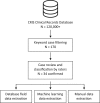Cognitive neuropsychiatric analysis of an additional large Capgras delusion case series
- PMID: 30794090
- PMCID: PMC6425915
- DOI: 10.1080/13546805.2019.1584098
Cognitive neuropsychiatric analysis of an additional large Capgras delusion case series
Abstract
Introduction: Although important to cognitive neuropsychiatry and theories of delusions, Capgras delusion has largely been reported in single case studies. Bell et al. [2017. Uncovering Capgras delusion using a large scale medical records database. British Journal of Psychiatry Open, 3(4), 179-185] previously deployed computational and clinical case identification on a large-scale medical records database to report a case series of 84 individuals with Capgras delusion. We replicated this approach on a new database from a different mental health service provider while additionally examining instances of violence, given previous claims that Capgras is a forensic risk.
Methods: We identified 34 additional cases of Capgras. Delusion phenomenology, clinical characteristics, and presence of lesions detected by neuroimaging were extracted.
Results: Although most cases involved misidentification of family members or partners, a notable minority (20.6%) included the misidentification of others. Capgras typically did not present as a monothematic delusion. Few cases had identifiable lesions with no evidence of right-hemisphere bias. There was no evidence of physical violence associated with Capgras.
Conclusions: Findings closely replicate Bell et al. (2017). The majority of Capgras delusion phenomenology conforms to the "dual route" model although a significant minority of cases cannot be explained by this framework.
Keywords: Delusional misidentification; forensic; neuropsychiatry; psychosis; schizophrenia.
Figures
References
-
- Bauer R. M. (1984). Autonomic recognition of names and faces in prosopagnosia: A neuropsychological application of the guilty knowledge test. Neuropsychologia, 22(4), 457–469. - PubMed
-
- Bell V., Halligan P. W., & Ellis H. D. (2006). Explaining delusions: A cognitive perspective. Trends in Cognitive Sciences, 10(5), 219–226. - PubMed
-
- Berson R. J. (1983). Capgras’ syndrome. American Journal of Psychiatry, 140(8), 969–978. - PubMed
Publication types
MeSH terms
Grants and funding
LinkOut - more resources
Full Text Sources

